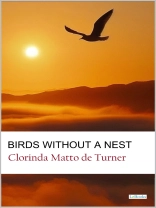Birds without a Nest is a sharp critique of social injustices, Indigenous oppression, and institutional corruption in 19th-century Peru. Clorinda Matto de Turner exposes the inequalities within society, highlighting the clash between the Creole elite and Indigenous communities, particularly concerning abuses of power, racism, and exploitation. Through characters like Fernando and Lucía Marín, the novel portrays the struggle for justice in an environment marked by discrimination and resistance to change.
Since its publication, Birds without a Nest has been recognized for its bold denunciation of social issues and for inaugurating a literature committed to Latin American realities. Its exploration of themes such as political corruption, the role of women, and inequality has ensured its relevance within the literary canon. The novel not only documents an era but also offers a critical perspective that continues to resonate in contemporary contexts.
Its enduring significance lies in its ability to illuminate conflicts between tradition and progress, justice and privilege. By examining the tensions between idealism and oppressive structures, Birds without a Nest invites reflection on power dynamics and the barriers that still persist in society.
关于作者
Clorinda Matto de Turner was a Peruvian writer and journalist, recognized for her contribution to indigenist literature and her fight for the rights of Indigenous peoples and women in Latin America. Her work challenged the social and political norms of her time, addressing issues such as injustice, colonial oppression, and cultural identity. Despite facing censorship and persecution, her legacy endures as one of the most influential voices of the 19th century in Hispanic American literature.
Matto de Turner became one of the first women to direct a newspaper in Peru when she took charge of El Perú Ilustrado. Her journalistic and literary work was marked by her defense of indigenism and her criticism of power structures dominated by the oligarchy and the Church. Her most famous novel, Birds without a Nest (1889), denounces the abuses of landowners and clergy against Indigenous people, becoming a milestone in Latin American social literature.
Matto de Turner was a pioneer of indigenism, a literary and social movement that sought to defend the rights and culture of Indigenous peoples. Her work influenced writers such as José María Arguedas and Ciro Alegría, who continued exploring Indigenous realities in their writings. Additionally, her advocacy for women's education and gender equality made her a key figure in Latin American feminism.
Her narrative style, clear and direct, combined elements of realism with strong social commitment. Through her writings, she denounced the structural injustices affecting Indigenous communities and promoted a shift in the mindset of Peruvian society at the time.












